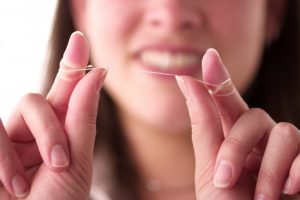
Whether it’s the extra time it takes at the end of the night, or just because they aren’t sure how, people often skip out on flossing. It’s a short process that can do wonders for your oral health. Every time you visit your dentist in Dublin for your checkup and cleaning, they’ll usually spot bleeding gums and ask whether you floss daily. When you trip up and admit that you’re not, you feel like you’re letting them down a little bit. Instead of juggling the dental guilt, learn just how much daily flossing can do for your oral health by reading below.
What Can Flossing Do For Your Oral Health?
Research that was published in the Journal of Dental Hygiene showed that daily flossing and brushing can help reduce gingivitis compared to just brushing alone. Food particles can become trapped between your teeth and be the source of bad breath and turn your mouth into a bacterial breeding ground when left unremoved.
When you don’t floss, you’re not able to remove as much plaque buildup, which feeds harmful oral bacteria. When these bacteria are left to accumulate, they can cause irritated, swollen, and bleeding gums and eventually result in gum disease, or gingivitis. The same plaque that can lead to this bacterial gum infection can also destroy your enamel and cause cavities to form.
How Can Flossing Benefit Your Overall Health?
Oral health problems like gum disease have been connected to several health problems found throughout the body. When harmful oral bacteria collect in your mouth, they can release toxins that can get into your bloodstream and travel throughout your body. This disease has been linked to conditions and illnesses including:
- Diabetes
- Cardiovascular disease
- Respiratory issues
- Pregnancy complications
When you floss daily, it helps control the number of bacteria in your mouth by removing food particles. In turn, it can also reduce your risk of gum disease and developing serious health problems as well. Looking after your overall wellbeing starts with keeping up with your oral hygiene at home and visiting your dentist for your regular checkups and cleanings.
How And When Should You Floss?
It’s recommended to floss at least once each day, preferably before you go to bed to remove any food and plaque built up between your teeth and gumline throughout the day. It’s important to use waxed floss so it doesn’t damage your gums. You could also get a water flossing machine if you aren’t able to effectively maneuver the floss.
Be sure to keep a small container of dental floss on your bathroom counter as a reminder to floss daily. Your dentist will be proud next time you visit them for your checkup and cleaning, and you have great looking and healthy gums that don’t bleed when they floss!
About the Author
Dr. Hannah Burton grew up in Dublin and returned to help her community achieve healthy and happy smiles. She takes pride in giving her patients individualized care they can trust. As an active member of the American Dental Association and the Ohio Dental Association, she keeps up with the latest advancements in her field so she can give her patients the high-quality care they deserve. For questions or to schedule a routine checkup and cleaning, visit Distinctive Smiles of Dublin’s website or contact 614-792-1800.
